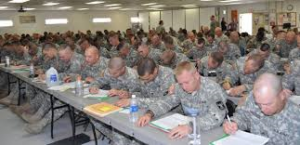Newly Improved Transition Assistance Program Well Received

By Debbie Gregory.
The Transition Assistance Program (TAP) provides transition assistance to promote, advance and instill a culture of education and/or employment readiness to Service members.
In the latest survey results from graduates, an overwhelming majority of former service members expressed that they felt that the newly redesigned TAP curriculum well prepared them to re-enter the civilian workforce. The redesigned program encompasses the requirements of the VOW to Hire Heroes Act of 2011.
Under the leadership of Susan Kelly, the director of the Transition to Veterans Program, the program was significantly expanded two years ago.
Expanded to a week-long, mandatory curriculum now offered in full at 206 installations, TAP provides information, tools, and training to ensure Service members and their spouses are prepared for the next step in civilian life, whether pursuing additional education, finding a job in the public or private sector, or starting their own business. This redesigned TAP is the result of an inter-agency collaboration to offer separating Service members and their spouses better, more easily accessible resources and information to make their transitions more successful.
Kelly emphasized the program’s four core components:
- Adopt career readiness standards (CRS) which measure a service member’s preparedness to depart from active duty;
- Develop Transition GPS, a curriculum that builds the skills needed by service members to meet the CRS;
- A capstone event, during which commanders verify their members have met career readiness standards or, if not, ensure that they receive additional training or a warm handover; and
- Implementation to the military life-cycle transition model, which aligns transition activities with touch-points across the military career.
Kelly said that according to the most recent participant assessment data, more than 80 percent of the participants said they “gained valuable information and skills to plan their transition, that the training enhanced their confidence in their transition, they intended to use what they learned in the classes, and that they knew how to access appropriate resources post separation.”
In the last two years, both public and private organizations recognized that service members “present an incredible pool of talent and they seek increased opportunities to harness that talent,” Kelly said.
Military Connection salutes and proudly serves veterans and service members in the Army, Navy, Air Force, Marines, Coast Guard, Guard and Reserve, and their families.

















